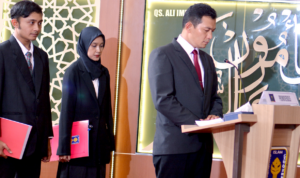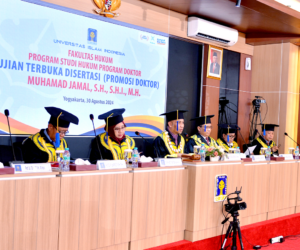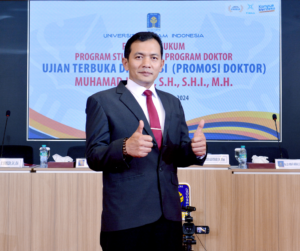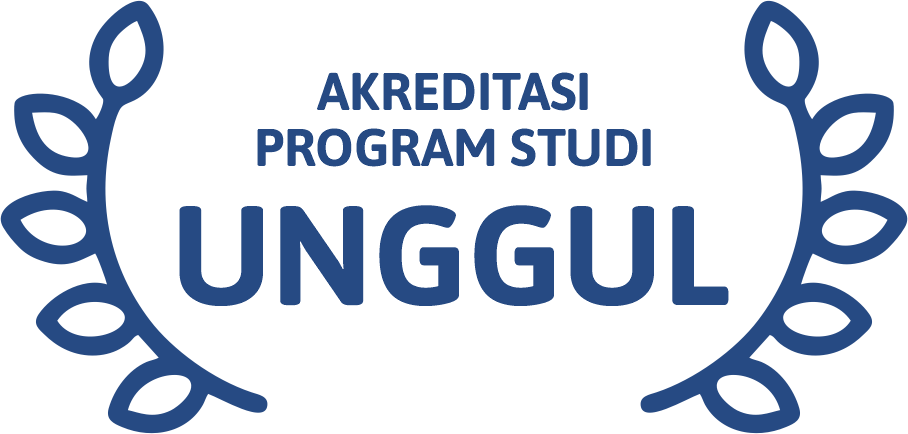Muhammad Jamal’s Public Defense Examination

“The state has established the Election Law (Law 7/2017) to create a democratic and integrity-based state system. Unfortunately, not all elections can be conducted fairly and with integrity.”
[KALIURANG]; On Friday (30/08) at 13:30 WIB, the Public Defense Examination for Doctoral Promotion was conducted by the Doctoral Study Program in Law (PSHPD) at the Faculty of Law (FH) Universitas Islam Indonesia (UII). Muhammad Jamal, S.H., S.H.I., M.H. was the doctoral candidate, presenting his dissertation titled “Imposition of Probationary Criminal Verdicts on Perpetrators of General Election Crimes in the Perspective of Progressive Law.” The examination took place in the Auditorium Room, 4th Floor, FH UII, and was chaired by Prof. Dr. Budi Agus Riswandi, S.H., M.Hum., the Dean of FH UII. The promotion committee consisted of Prof. Dr. Rusli Muhammad, S.H., M.H. as the promoter and Dr. Mahrus Ali, S.H., M.H. as the co-promoter. The examiners included Prof. Hanafi Amrani, S.H., LL.M., M.H., Ph.D., Dr. Sri Hastuti Puspitasari, S.H., M.H., Prof. Dr. M. Syamsudin, S.H., M.H., and Prof. Dr. Tongat, S.H., M.Hum., who joined online via Zoom.

During the examination, Muhammad Jamal pointed out that light penalties, such as probation, are often given to those who commit election, led to the increasing number of general election crimes. Based on this issue, Muhammad Jamal analyzed the judge’s considerations in imposing probation sanctions for election crimes and linked them to the spirit of progressive law.
Muhammad Jamal explained that the court decisions on election crimes he reviewed did not meet the four key principles of progressive law. For example:
- Law as a Dynamic Institution: The decisions didn’t meet this principle because judges only focused on whether the facts matched the legal article, without considering how the law might evolve.
- Law as a Teaching of Humanity and Justice: The decisions does not go through consideration/ratio decidendi so that it does not provide humanitarian aspects and did not offer insights into justice.
- Law as an Aspect of Regulations and Behavior: The decisions failed to connect the enforcement of fair elections with the core principles of people’s sovereignty and political essence, which is the third principle.
- Law as a Teaching of Liberation: The decisions were too narrow, focusing only on legal elements without exploring broader and does not go into depth or extend to other non-legal aspects.
In his dissertation, Muhammad Jamal proposed a construction for judges’ decisions on election. He suggested that future court decisions in these cases should embody five key qualities: court decisions must reflect a free paradigm in deciding election crime cases, court decisions must become dynamic laws, court decisions as teachings of humanity and justice and court decisions must contain aspects of regulations and behavior in a balanced manner. To realize these four qualities, three important elements are formulated, namely: (a) in deciding future cases, judges must take into account the sovereignty of the people and their rights, (b) the judge must emphasize in his legal considerations the degree of seriousness of the impact of election crimes on people’s sovereignty and voting rights in reasoning his legal considerations, (c) based on the theory of proportionality in punishment, the adoption of these considerations will lay a stronger basis for justification for judges to impose proportional criminal sanctions on perpetrators of election crimes. In this case, the judge can impose a probationary sentence as a sanction for election crimes whose impact is categorized as light. For election crimes whose impact is categorized as medium or serious, judges can use prison sentences and fines proportionally according to the impact caused.

During the exam session, the doctor candidate was able to answer questions well and was able to defend the arguments in his dissertation. Muhammad Jamal S.H., S.H.I., M.H. is now officially the 179th doctor of law who graduated from the doctoral study program in law, Faculty of Law, Universitas Islam Indonesia.







